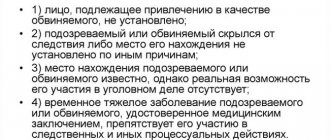Sample petition to terminate a criminal case with a court fine
Investigator of the Investigation Department
Ministry of Internal Affairs of Russia for city X
Art. Lieutenant of Justice A.A.A.
from the accused B.B.B.
and lawyer V.V.V.
H O D A T A Y S T V O
on termination of the criminal case
The investigation department of the Ministry of Internal Affairs of Russia for the city of X is investigating a criminal case on charges of V.V.V. in committing a crime under Part 2 of Art. 159 of the Criminal Code of the Russian Federation.
According to the provisions of Article 76.2. Under the Criminal Code of the Russian Federation, a person who has committed a crime of minor or moderate gravity for the first time may be released by the court from criminal liability with the imposition of a judicial fine if he has compensated for the damage or otherwise made amends for the harm caused by the crime.
In accordance with Article 25.1. of the Code of Criminal Procedure of the Russian Federation, the court, on its own initiative or based on the results of consideration of a petition filed by an investigator with the consent of the head of the investigative body or by an inquiry officer with the consent of the prosecutor, in the manner established by this Code, in cases provided for in Article 76.2 of the Criminal Code of the Russian Federation, has the right to terminate a criminal case or criminal prosecution in relation to a person suspected or accused of committing a crime of minor or medium gravity, if this person has compensated for the damage or otherwise made amends for the harm caused by the crime, and impose a criminal law measure on this person in the form of a court fine.
As established by the investigation, B.B.B. is a person brought to criminal responsibility for the first time, the crime charged to him is classified as of medium gravity, no harm was caused by the crime committed, and legal relations protected by criminal law have been restored.
The accused has an objective financial opportunity to pay the court fine imposed by the court.
Considering the above, accused B.B.B. and his defense lawyer V.V.V. petition the investigative body to terminate the criminal case by releasing the accused from criminal liability with the imposition of a court fine.
The legal consequences of terminating a criminal case on non-rehabilitating grounds are clear.
The defense side agrees with the termination of the criminal case on the grounds provided for in Article 76.2 of the Criminal Code of the Russian Federation, Article 25.1. Code of Criminal Procedure of the Russian Federation.
Signature Accused B.B.B.
Signature Lawyer V.V.V.
03.01.2018
in .rtf format
Article - “Imposition of a judicial fine with exemption from criminal liability”
Application Form
[flat_ab id=”2"] When writing such a document in a criminal case, it is necessary that it has an official appearance, is neat, concise and well-written. The text of a standard petition can be divided into three main sections: the introductory part, the descriptive section and the operative section. The table of contents-header (introduction) indicates:
- full name of the authority, as well as the name of the investigator who is involved in pre-trial paperwork;
- your full name, as well as residential address and contact information (telephone numbers, email);
- information about other participants and interested parties, their procedural position in the case.
[f[flat_ab id=”3"]Next, the main (descriptive) part is drawn up - this is the most important section. The situation should be stated here, as well as the reasons why the petition is being submitted. All this must be supported by arguments and facts, always being referenced in your explanations on the legislative basis. After the main text, the applicant indicates the requirements that he puts forward. In their justification, it is imperative to be guided by the provisions of the laws regulating the rights and obligations in a particular case. At the end of the document, a list of attached materials is compiled to support your position. The number of them copies must correspond to the number of participants and interested parties in the case. Afterwards, the date of submission to the relevant authorities is set, and the document is signed by the applicant (necessarily with an explanation of the surname). [fla[flat_ab id=”4"]
Possible reasons for refusal to accept an application
If the consideration of the case is beyond the competence of the body to which the application was submitted. In this case, the request is either forwarded to the competent authority or returned to the applicant with advice to contact the relevant authority.
In the case where the application was submitted by a person or body that does not have the right to protect the interests of an individual. Only participants in the process or their legal representatives can submit an application, request or complaint. When the appeal does not describe in detail the violation and the reasons that prompted the applicant to file a complaint. The application must describe in detail the reasons and motives for the application.
If a decision has already been made on this case, or the parties have reconciled in a global government body. Subject to an arbitration decision.
Who can file petitions in court
- A motion is a fairly broad concept in the legal process. Depending on the applicant and the goals he pursues, it can be of a different nature, ranging from advice to requirements. The main participants include:
- The victim, his representative or a lawyer-representative have the right to apply for the purpose of carrying out certain procedural measures or making decisions that are intended to provide new circumstances of the proceedings that are significant for the case.
- A private prosecutor, who is either the victim himself or his legal representative, acting on the basis of a private accusation (the person who directly suffered the loss).
- The expert may request the judge to conduct additional forensic examinations to identify circumstances important to the case.
- Civil plaintiff , civil defendant, their representatives. Appeals during civil proceedings may concern the following issues: recusal of a judge or prosecutor, exclusion of witnesses or attraction of additional ones, the assistance of the court in the collection of additional evidence, the conduct of examinations, the termination of proceedings, etc.
- The suspect may also file a complaint for the above purposes.
- The accused may request additional examinations, replacement of the current defense attorney or lawyer, or the involvement of additional witnesses or third parties who may influence the course of the trial.
- The defense attorney of the suspect and accused has the right to file a statement on any issue of interest to him.
- , a representative of an organization or a public prosecutor has the right to initiate a preliminary hearing of the case, exclude the evidence provided, and bring in additional witnesses.
- Another person whose interests are affected during the investigation or legal proceedings. These persons may include: specialists, translators, witnesses and their lawyers, experts, witnesses or search witnesses, convicts. All these categories of participants in the trial have the right to make requests to the court.
Main categories of motions in court
The law allows appeals to be submitted both in written and oral (during court hearings) forms. However, it will be better if it is in writing and officially submitted to the judge through the office, where it will be assigned an incoming correspondence number. When sending a letter of appeal by mail, it is better to resort to a registered letter with a list of attachments.
Many years of practice have divided the main questions most often found in appeals into certain categories in order to facilitate the process of compiling them:
- Conducting examinations – everything related to issues related to conducting examinations or considering their results;
- Progress of execution - appeals are submitted after the judge has made a decision and it has entered into force;
- Legal expenses – questions relate to the payment of state fees or any other expenses incurred related to legal proceedings;
- Restoration of deadlines - appeals that indicate requests for the restoration of deadlines specified in the law: limitation periods, appealing the actions of a judge, proceedings on labor conflicts, filing complaints against a judge’s decision.
On what basis can petitions be filed in court?
The law (Article 119 of the Code of Criminal Procedure of Russia) classifies appeals in the following order:
- On the performance of procedural actions: the purpose of the appeal is to attract the attention of the court to the action or inaction of the opposing participant in the proceedings, directly or indirectly calling into question the fact of the person’s non-involvement/involvement in the subject of the conflict with further proceedings.
- On making procedural decisions: the purpose of the appeal is to request a decision to extend or terminate the current proceedings.
Application Process
The described form of appeal requires a mandatory response from the investigator leading the case. This is especially true when a request is refused. Any refusal must be accompanied by a written explanation. Therefore, the official, after familiarizing himself with the materials presented in the petition, makes an appropriate decision (as opposed to the court where the ruling is made) on granting or denying the petition, and sends copies of it to all interested parties. Moreover, the request can be satisfied either in full or in part.
According to the Code of Criminal Procedure of the Russian Federation, your petition to the investigator in a criminal case must be considered immediately. Of course, there are cases where the review may take up to three business days, but only as a last resort and for a very good reason. However, this is only an exception to the rule, and in practice it happens extremely rarely. The law establishes the right of citizens to appeal decisions made in criminal cases by competent authorities. To do this, an appeal must be filed within 15 days, and if the decision enters into legal force, you must contact the cassation authority within a month.
Information that must be included in the application
Although the law does not regulate the content and form of the appeal, you still need to adhere to the basic rules of design.
When filling out the application, be sure to leave some space to write the case number and provide the following information:
- The name of the court you are applying to is the official name of the government agency.
- Full name of the applicant and his contact information - reliable contact information must be indicated by which the applicant can be contacted if necessary. This could be: mobile phone number, email, Skype. If the applicant is a legal entity, you must indicate the contact details and full name of the company’s authorized representative.
- Full name of the defendant and his contact information. If the applicant is an individual, you must indicate your residential address and telephone number; if the applicant is a legal entity, you must indicate the legal address of the company.
- Purpose of the petition . You need to succinctly describe the reason and purpose of the application.
- The circumstances under which the rights, freedoms or interests of the applicant were violated . Briefly describe everything you remember about the reason for filing the application.
- Evidence of what is happening. Provide evidence of unlawful acts committed against you or the person you represent.
- Requirements. State your requirements to the court, defendant, defense attorney, witness, etc.
- Cost of the claim and calculation of other legal amounts. If you wish to return the funds spent, indicate this in the application, providing arguments.
- Information about the applicant's pre-trial appeals to the defendant. Be sure to indicate whether you have previously communicated with the defendant on the topic of the trial; if so, indicate the topic of the conversation.
- List of all documents attached to the application. List the documents attached to the application. This will eliminate the possibility of losing important evidence or refutations.
sample application in MS Word format.





